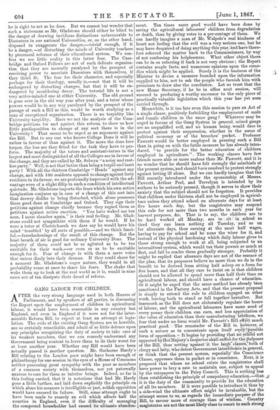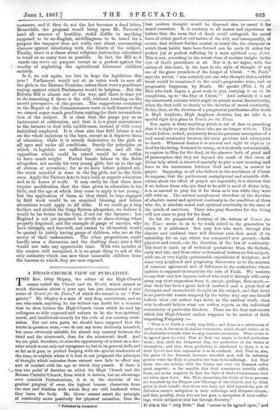GANG LABOUR FOR CHILDREN. A FTER the very strong language used
in both Houses of Parliament, and by speakers of all parties, in discussing the Report upon the employment of children in agricultural labour, it would have been reasonable in any country but England, and even in England if it were not for the inter- minable Reform Bill, to expect at least an attempt at legis- lation. The evils of the existing Gang System are so horrible, are so certainly remediable, and admit of so little defence upon any principles recognizing the duty of society to take care of its weakest members, that we can scarcely understand any Government being content to leave them to do their worst for at least another year. Whether any Bill would have been actually passed is another question. Mr. Gathorne Hardy's Bill relating to the London poor might have been enough of philanthropy for one session in the eyes of a House of Commons neither possessing great sympathy with the poor as members of a common society with themselves, nor yet paternally anxious to care for them as inferior beings. Indeed, so far is this feeling carried, that it is notorious that had Mr. Hardy gone a little further, and laid down explicitly the principle on which alone his measure is intelligible or just, selfish opposition would have ensured its failure. Still, some attempt ought to have been made to remedy an evil which affects half the counties in England, even if the difficulty of managing the compound householder had caused its ultimate abandon- ment. Ten times more good would have been done by saving the agricultural labourers' children from degradation or death, than by giving votes to a per-centage" of them. We can hardly imagine a man of Mr. Walpole's real kindness of heart not feeling that the evil was a very Serious one, but he may have despaired of doing anything this yiarrand have there- fore referred the matter back to the Commissioners, by way of not confessing his helplessness. 'What 'other' object there can be in so referring it back is not very obvious ; the Report contains ample facts, and numerous opinions upon the reme- dies which might be applied. Surely it is the business of the Minister to devise a measure founded upon the information supplied to him, not to ask the people who furnish him with premisses to draw also the conclusion. Let us trust that the new Home Secretary, if he be in office next session, will succeed in producing a worthy successor to the only piece of practically valuable legislation which this year has yet seen carried through.
Meanwhile, is it too late even this session to pass an Act of a single clause, positively forbidding the employment of male and female children in the same gang ? Whatever may be urged in favour of the Gang System in general, mixed gangs are an unqualified evil, and no human being. would dare to protest against their suppression, whether in the name of political economy or of the breeches' pocket. ; Professor Fawcett would be better employed in pressing such a Bill than in going on with the futile measure he has already intro- duced, "to provide for the better education of ."children employed in agriculture."; The working: classes have few friends more able or more zealous than Mr. Fawcett, and it is no wonder that he should have felt strongly the mischiefs of the present systemand should have reeolved to protest strongly against letting ill alone. But we can hardly imagine that the Bill recently introduced under the sponsorship of Messrs. Fawcett, Arthur Peel, and Trevelyan is intended by its authors to be seriously pressed, though it serves to show their anxiety that the subject should not be forgotten. It provides that children under thirteen shall not be employed in agricul- ture unless they attend school on alternate days for at least five hours each day, but the magistrates may suspend this rule for not more than two months in each year for harvest purposes, &c. That is to say, the children are to be hard worked all Monday, are to sit r in school so tired they can learn nothing all Tuesday, and so on for alternate days, thus earning at the most half wages, having to pay for school and be none the Wiser for it, and instead of the physical hardening which daily labour gives to those strong enough to work at all, being subjected to an intermittent system, which would tax their powers as mach at first, and fail to render them gradually stronger. Probably it might be replied that alternate days are not of the essence of the plan, that its proposers believe no more than we do in the benefit to be derived from sitting half asleep ,on a form for five hours, and that all they care to insist on is that children should not be allowed to spend more than half their time on agricultural labour, and should have a chance of education. Or it might be urged that the same method has already been sanctioned in the Factory Acts, and that the present proposal is simply to extend the rule to children engaged on other work, leaving both to stand or fall together hereafter. But inasmuch as the Bill does not elaborately regulate the hours of labour, and the agricultural labourers have more need of every penny their children can earn, and less appreciation of the value of education than their manufacturing bietliren, we fear that under no form' would Mr. Fawceit's Bill effeet much practical good. The remainder of the Bill is, 'however, of such a nature as to concentrate upon itself eveiyoisible form of opposition. It begins by providing that no-sehl'ol not approved by Hei Majesty's Inspector shall sufficitfor the guiposes of the Bill, thus setting 'against it the large clasies,"both of clergy and laity; Who detest Government interfeiefiee in general, or think that the present system, especially- the Conscience Clause, oppresses them in pocket or in conscience. Next, it is proposed that where no school exists the magistrates shall have power to levy a rate to maintain one, subject to appeal by the ratepayers to the Privy Council. This is nothing leas than establishing the principle of compulsory education,—thatj it is the duty of the community to provide for the education of all its members. If it were possible to introduce it thus by a side-wind the ultimate effect might be invaluable, but the attempt seems to us, as regards the immediate purpose of the Bill, to savour more of courage than of wisdom. ` Country magistrates are not the most likely class to resort to such strong
measures, and if they do not the Act becomes a dead letter. Meanwhile, the proposal would bring upon Mr. Fawcett's head all manner of hostility, stolid dislike to anything supposed to be un-English, unwillingness to be taxed for a purpose the taxpayer does not really care about, unreasoning clamour against interfering with the liberty of the subject. Finally, there is a clause about religious instruction calculated to tread On as many toes as possible. In fact, the Bill as it dands can serve no purpose except as a protest against the cruelty of neglecting the agricultural labourers' children entirely.
Is it, we ask again, too late to hope for legislation this year ? Parliament would not sit an extra week to save all the girls in the Eastern Counties, unless there were a pestilence raging, against which Parliament.would be helpless. <: But the Reform Bill is almost out of the way; and there is time yet to do something if there is the will, without, treading on the sacred prerogative of the grouse. ,The suggestions contained in the Report of the Commissioners were so half-hearted that we cannot argue much .good fronkwaiting for their reconsidera- tion of the subject. It is clear that: the gangs pay as an instrument of cultivation, and that it is a great convenience to the farmers to deal with middle-men, instead of with every individual employed. It is clear also that field labour is not . on the whole injurious to the boys, except as it deprives them ,of education, while it is utterly destructive to the girls at all ages and under all conditions. Surely the principles on which to legislate are sufficiently obvious, and all the opposition which could be raised would be too selfish to have much weight. Forbid female labour in the fields altogether, not merely for very young; girls, but up to the age of sixteen. or seventeen ; for as we have before pointed out, the worst mischief is done to the big girls, not to the little ones. Apply the FactoryActs to boys, both as regards education and as to hours of work. It may easily be that those Acts require modification, that the time given to education is too liitle, and the age at which they cease to apply is too young ; but the apPlication of them, as they stand, to boys engaged in field work would be an unmixed blessing, and future alterations would apply to all alike. If we could go a step farther, and abolislithe Gang System altogether, we believe it would be far better for the boys, if not for the farmers ; but England is not yet prepared to revolt at slave-driving when
• properly disguised, and the example of gangs of navvies, who have strerigth; and. free:will; and canUot be ill-treated, would
• be quote-Ai) justify hiving gangs of children, who are at the
• mercy of "their taskmasters. The other propositions: could hardly raise a discussion, and the drafting them into a Bill would not take any appreciable time. With two months of the session still unexpired, it is no great thing to ask of the only authority which can save these miserable children from the horrors to which they are now exposed.































 Previous page
Previous page